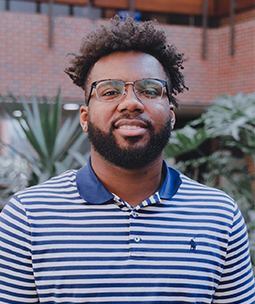The Bob Graham Center is pleased to announce the six University of Florida faculty who have been selected as recipients of the 2022-23 Haskell Faculty Research Award.
These faculty scholars will receive a grant of up to $3,000 to fund research on topics related to the Graham Center’s principles of civic engagement, public leadership, and public service. The results of each project will be completed by the end of the 2022-2023 academic year and disseminated in the public sphere.
Each faculty recipient has also identified a UF undergraduate who will take a meaningful research role on the project and be acknowledged as a co-author or contributor. The student will receive $750 at the beginning of each semester during the project’s duration for up to three semesters.
The selected research fellows and their projects follow.
Dr. Hannah Alarian and Payton Capes-Davis
Immigrant Voting Rights in the United States
Dr. Hannah Alarian, an assistant professor of political science at UF, and Payton Capes-Davis, a history and political science double major, are analyzing how non-citizen voting rights affect U.S. citizens and immigrants to the United States.
They will conduct surveys of both statewide and national audiences to better understand who among the American public supports providing non-citizens with local voting rights, as well as the impact such suffrage would have on immigrant communities. At present, 15 cities across the country allow non-citizens to vote in local elections with many more considering ballot proposals to expand local immigrant voting rights.

Dr. Alarian is a faculty affiliate of the Center for Arts, Migration and Entrepreneurship and Center for European Studies. Her research in comparative political behavior explores topics related to global migration, citizenship, and immigrant incorporation.
She has published on the politics of migration, belonging, and public opinion globally. Her work can be read in Comparative Political Studies, German Politics and Society, the Journal of Ethnic and Migration Studies, the Journal of Race, Ethnicity, and more.
Payton Capes-Davis is pursuing a history honors thesis under the supervision of Dr. Matthew Jacobs, where she examines the relationship between U.S. immigrant policy and anti-immigration vigilante groups in U.S. Southern border states. She is also a varsity college athlete and competes for the Florida Gators track and field team.
Dr. Sharon Austin and N’Jhari Jackson
Black Student Athlete Activism
Dr. Sharon Austin, a professor of political science at UF, and N’Jhari ‘Jay’ Jackson, a UF senior majoring in the journalism sports and media track, will examine the activism and civic engagement of African American college athletes in the United States.
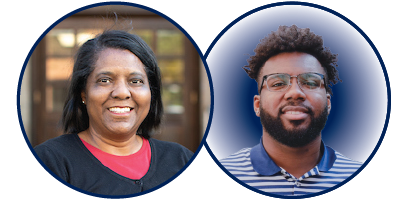
Their research will determine what kinds of protest and civic engagement activities that college athletes are presently engaged in, whether female athletes participate more in these movements than male athletes, how university and athletic administrators have responded to the activism, and what changes have come about as a result of the activism.
Dr. Austin’s research focuses on African American women’s political behavior, African American mayoral elections, rural African American political activism, and African American political behavior. Her teaching interests are in minority politics, American government, public law, and public policy.
She has written extensively on race, politics, and socioeconomic disparities with a specialized focus on African American experiences.
Jay Jackson, an Eagle Scout and former Gator football player, is also a community advocate for causes such as pediatric cancer research and heart screenings for athletes. He enjoys creative writing and has self-published four books.
He and Dr. Austin have collaborated previously on essays for The Conversation, the Washington Post, and Governing Magazine: Cincinnati, A New Mayor Preaches a New Beginning, and Muslims Control Michigan’s ‘Little Warsaw.’ Is It a Hollow Prize?,
Dr. Manoucheka Celeste and Joashilia Jeanmarie
Women’s Approach to Creating and Sustaining Community Among Haitian Immigrant Farmworkers
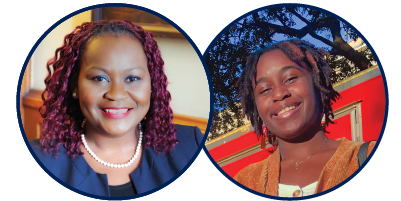
Dr. Manoucheka Celeste, an associate professor in the Center for Gender, Sexualities, and Women’s Studies Research at UF and Joashilia Jeanmarie, a sociology and African American studies double major, will study the role of women in building and sustaining community networks among immigrant Haitian farmworkers in Immokalee.
Through their research, they hope to expand understanding of the plight of immigrant Haitian communities beyond the simplistic, faceless narratives that routinely appear in news accounts. Their project will also illuminate political policies that impact Haitians, who comprise as much as 35% of farmworkers in Florida.
Dr. Celeste is also a faculty member in UF’s African American Studies Program and an affiliate faculty with the Center for Latin American Studies and Center for Arts, Migration, and Entrepreneurship. She conducts research on media representations of race, gender, class and sexuality, and on identity formation in the U.S. and Caribbean, with an emphasis on Haiti.
Her book Race, Gender, and Citizenship in the African Diaspora: Travelling Blackness received the National Communication Association’s Diamond Anniversary book award.
Joa Jeanmarie grew up in a farmworker family in Immokalee. During the COVID pandemic, Joa used the access and bilingual skills from their childhood to conduct extensive door-to-door healthcare outreach with the Florida Department of Health and community healthcare clinics. In this research project, Joa will merge community organizing experience with academic interests in Haitian feminism, race and racism, and farmworker activism.
Joa is president of the UF chapter of the Student/Farmworker Alliance, which partners students with the Coalition of Immokalee Workers to advocate for food justice, farmworker rights, and an end to exploitation in the fields.
Dr. Lauren Pearlman and Paul Handberg
The Cost of Undocumented Immigrant Detention Facilities
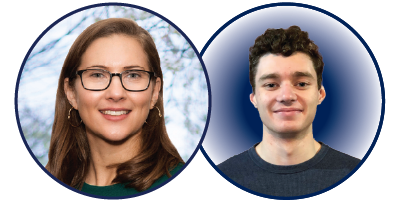
Dr. Lauren Pearlman, an associate professor in UF’s Department of History, and Paul Handberg, a history and finance double major, will collaborate on research to advance the public’s understanding of the relationship between migrant detention and the rapid growth of the private prison industry.
According to the researchers, a key and lucrative function of privately run prisons has become detention of undocumented immigrants. One of the primary leaders in the private prison industry earned over $500 million from contracts with U.S. Immigration and Customs Enforcement in 2017.
At the same time, they point out, ICE provides little oversight over the detention centers, and for immigrants, the danger of abuse and neglect is great.
As part of their Haskell-funded research, Dr. Pearlman and Paul will comb through the State Archives of Florida and New York University’s Tamiment Library to learn more about the Wackenhut Corporation, a Florida-based private security business that is now part of G4S Secure Solutions, the world’s largest private security system company.
Dr. Pearlman is a historian of modern America with a focus on the ways that law and order politics and anticrime policies affect urban policy and governance in the 20th century. She is the author of Democracy’s Capital: Black Political Power in Washington, D.C., 1960s-1970s. This research is related to her second book project, The Security State: The Rise of Private Security Industries in Post-World War II America.
Paul Handberg, a native of Oviedo, Florida, has research interests in the history of capitalism and American corporations, as well as the impact of public policy on the mass mobilization of grassroots movements during 20th century civil rights struggles. He has interned at UF’s Inquire Capitalism program and is a member of the UF fencing club.
Dr. Paul Ortiz and Vasilios Kosmakos
The Degradation of Florida’s Water Systems
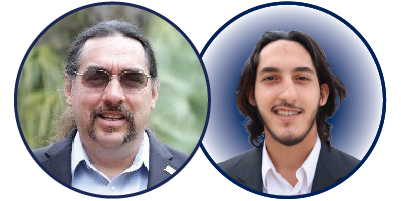
Dr. Paul Ortiz, the director of UF’s Samuel Proctor Oral History Program, and Vasilios Kosmakos, a sustainability and international studies double major, are documenting the impacts of Florida’s contaminated waterways on the state’s communities and environments.
Their goal is to inspire the change needed to help save the state’s most vulnerable ecosystems. Through a series of video interviews conducted in the Everglades and the Florida Keys, the research team will capture narratives from experts as well as everyday Floridians to broaden understanding of the impacts of waterway degradation and water management.
Dr. Ortiz, a professor of history at UF and past president of the Oral History Association, is a third-generation military veteran who served in multiple combat zones with the 82nd Airborne Division and 7th Special Forces Group. His pathway to academia included working as an organizer with the United Farm Workers of Washington State.
He is the author or co-author of five books including Emancipation Betrayed, An African American and Latinx History of the United States and most recently People Power.
As a student assistant in the Oral History program, Vasilios Kosmakos conceived of the Florida Naturalist Project to document the contemporary destruction of Florida’s waterways. He is past president of UF’s chapter of The Wildlife Society. Upon graduation, he plans to join the Peace Corps and then pursue a Ph.D. in sustainable development.
Dr. Ron Chandler and Chloe Dill
Influence of Social Media on Sustained Behavioral Change
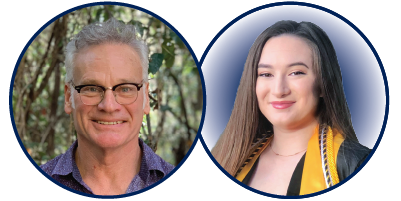
Dr. Ron Chandler, a lecturer in UF’s Department of Psychology, is working with psychology major Chloe Dill to test the effectiveness of social media messaging that can drive sustained and prosocial behavior change.
Their goal is to assess which is more influential in how we think and what we do: the role of self-efficacy — an individual’s belief in their own ability to succeed — or the presence of fear and threat, especially as those emotions motivate individual actions which benefit the community.
Dr. Chandler’s research and teaching focus is in the psychology of sustainability. He has a background as an environmental scientist, having earned an undergraduate degree in aquatic ecology and a master’s in limnology and aquatic chemistry. He holds a Ph.D. in educational psychology from Walden University.
He is the editor of The Psychology of Sustainability: Understanding the Relationship Between Self and Earth, and co-founded the Conservation Initiative for the Asian Elephant (CIFAE), a nonprofit attempting to resolve conflicts between Asian elephants and the people with whom they share habitat.
Chloe Dill has broad interests in environmental sustainability and community volunteering. She has interned for the Florida Community Innovation initiative and presently works in UF’s Office of Sustainability. Recently she has become involved with Alachua County public schools through her work with Just for Kidz, a UF-based student organization. She plans to pursue a Ph.D. in psychology.
